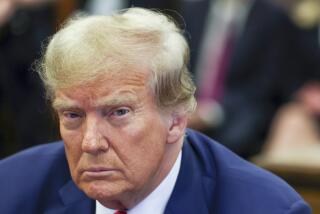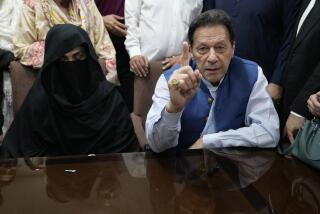Critics say Afghan court was lenient in bank corruption case
KABUL, Afghanistan — An Afghan tribunal handed down the first jail sentences Tuesday in the colossal Kabul Bank corruption case, sentencing the two former top executives to five-year sentences and ordering them to repay hundreds of millions of dollars in embezzled funds.
The convictions of former bank Chairman Sherkhan Farnood and former Chief Executive Officer Khalilullah Ferozi were the first to stem from the conspiracy by politically connected Afghans to loot the country’s biggest bank, whose collapse in 2010 nearly brought down the war-beaten economy.
The case was a major test for Afghanistan’s justice system, which had never before tried such a massive fraud case, or one that implicated powerful men with ties to President Hamid Karzai and other top officials — and critics judged the results to be disappointing. They noted that the three-judge panel convicted Farnood and Ferozi on a lesser charge of breach of trust, which carries a lighter sentence and didn’t include an order to confiscate millions from the disgraced executives’ offshore bank accounts.
Prosecutors had sought convictions for money laundering, embezzlement and other more serious crimes, which would have faciliated recovery of the stolen funds and together could have carried a maximum jail sentence of 20 years.
“Today was a disappointment for the resolution of issues resulting from the Kabul Bank fraud,” said Drago Kos, chairman of the Independent Joint Anti-Corruption Monitoring and Evaluation Committee, a panel of Afghan and international experts that issued a damning report on the bank failure last fall.
“International standards require sanctions that are proportionate, dissuasive and effective. We feel that this is lacking in the judgment issued today.”
Executives and top shareholders looted the private Kabul Bank of $935 million — including some squirreled out of the country in food trays of a now-defunct airline — sparking one of the largest bank failures ever. The theft amounted to some 6% of Afghanistan’s gross domestic product, financed shopping sprees and overseas villas for leading shareholders while leaving ordinary account holders broke, and dealt a huge blow to international confidence in the country’s fledgling public institutions.
Still, the prosecution of top officials moved forward only after the United States and other countries threatened to withhold future financial aid to Afghanistan.
Nineteen others also were convicted of crimes on Tuesday, but “many of those appear to have had little or no involvement in the fraud,” the committee said in a statement. They included government regulators who had tried to investigate the fraud, but were deceived by bank executives who created an elaborate system of double books, shell companies, corrupt accounting firms and other tricks to hide their crimes.
Spared from prosecution, so far, are two of the most prominent alleged thieves: President Karzai’s brother, Mahmood Karzai, and Haseen Fahim, the brother of the first vice president, the powerful ex-warlord Mohammed Qasim Fahim. Both have denied committing crimes.
Meanwhile, the man who first publicly revealed the involvement of Karzai and Fahim, former Afghanistan central bank Chairman Abdul Qadir Fitrat, was convicted in absentia of abusing his authority and not reporting the fraud to the government. Fitrat, who fled to the United States saying he feared retribution for his role in the case, was sentenced to 2½ years in jail.
The court ordered Ferozi to repay $530 million and Farnood to repay $278 million, but in practice experts said that it would be difficult for the government to recover the funds. The former executives were remanded to the custody of the National Directorate of Security, Afghanistan’s intelligence agency, and have 20 days to appeal the decision.
ALSO:
China’s Wen Jiabao leaves the public stage
Russian police detain suspect in Bolshoi attack
Venezuelan opposition leader faces fresh charges
Twitter: @SBengali
Special correspondent Hashmat Baktash in Kabul contributed to this report.
More to Read
Start your day right
Sign up for Essential California for news, features and recommendations from the L.A. Times and beyond in your inbox six days a week.
You may occasionally receive promotional content from the Los Angeles Times.







